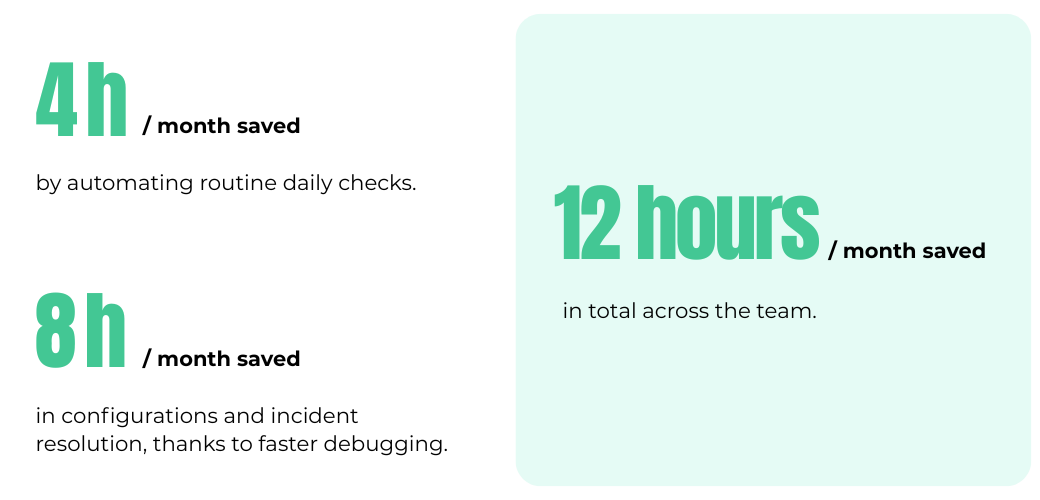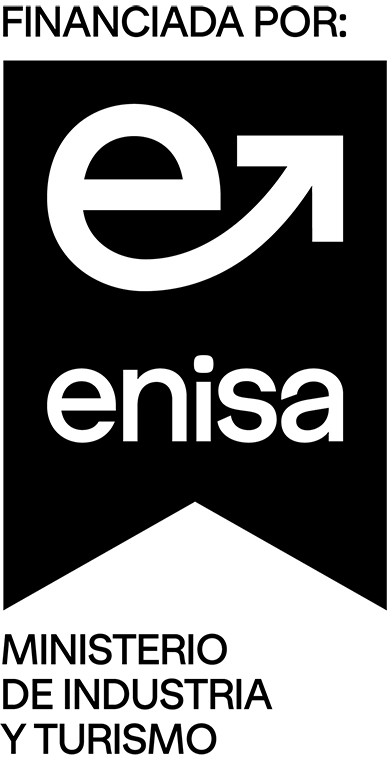Scaling Value, Not Time: How Elogia Transformed Its Agency Model Around Value‑Based Partnerships
And how Trackingplan played a key role in enabling that transformation.


Faced with margin pressures and the transformative potential of AI, Elogia (Viko Group) has spent the last two years redefining its entire business model—shifting away from traditional, hours‑based billing towards a results-driven approach centered on the real value offered to clients. A paradigm shift that has reshaped the agency landscape by replacing legacy time‑sheet models with an outcome-based service approach.
To explore this transformation, we sat down with Tanya Recouso, Product Director at Elogia, to understand her strategic vision, and with Miguel Rodríguez, Head Leader of Elogia’s Data Tech Hub, who took us behind the scenes to show us how his team experiences Trackingplan in their day-to-day.
When asked what led the team to transform their pricing model and shift towards one based on the value they deliver, Tanya was clear; continuing to grow under a traditional, hour-based model just wasn’t scalable enough to support growth.
At the same time, the rise of AI reinforced this reality. With tasks like ideation, documentation, and content creation already heading that way, it became clear that manual QA processes could also be significantly optimized—saving time on tasks such as reproducing every scenario when investigating issues or auditing event tracking—details we’ll explain below.
“We saw that AI could help us save a lot of time on things we used to do manually. That was a signal to pivot into a model that’s not tied to effort, but to value.”
It was this combination—the limits of the traditional model and the promising potential of AI-driven automation—that ultimately pushed Elogia to embrace this value-focused approach.
“What we do is focus on the value our work brings to each client and capitalize on that value. How long it takes us should be irrelevant, as what matters to our clients are the results—whether it’s leads, sales, visibility...”
However, with this new business model, operational efficiency stopped being just a nice-to-have. Investing in automation, AI, or process optimization became essential for the agency’s growth and long-term success. To manage more clients and deliver greater value without simply adding hours or increasing resources, Elogia had to find ways to work smarter, not harder.
At the heart of this transformation was Tanya. Her mission: to empower every hub at Elogia to manage as many clients as possible by reducing time spent on repetitive, manual tasks—all without compromising quality or client satisfaction.
However, before adopting Trackingplan, Miguel’s Data Tech team was constantly overwhelmed with manually auditing each client’s tracking setup, recreating edge-case scenarios to verify events, and checking that DataLayer updates were firing correctly—creating a significant gap between operational reality and efficiency goals.
After an extensive search for tools, Trackingplan emerged as a clear opportunity to improve and align processes with the company’s broader vision of scalable growth.
"Our Data Tech team was always swamped. And that’s because we were doing all that QA in a much less efficient way."
Some of the key challenges they faced included:
Tanya also shared that, before using Trackingplan, Elogia relied on their internal auditing methodology, Radia, to assess the state of each new client's tracking setup. This initial audit provided them with a snapshot of how events were configured and whether the DataLayer was functioning correctly.
However, much of this process was manual, time-consuming, and was only conducted once —usually at the beginning of every project or when major website changes occurred.
“The deliverables got done, but they took much longer and weren’t done regularly. We’d create the DataLayer guide and check the implementation once, but it wasn’t a continuous process.”
From a technical standpoint, Miguel also explained that conducting these audits or investigating issues involved a lot of manual work. For example, if they needed to do a purchase test, they had to repeat the test for every payment method to ensure everything was tracked correctly. Each scenario and edge case had to be recreated manually, making the process slow and prone to gaps.
Consequently, with no ongoing monitoring in place, there were times when the team lacked the visibility to detect errors early.
As Tanya explains, this made their approach inherently reactive:
“We used to have a much more reactive approach to client issues. If something broke, we’d fix it after the fact. But we just didn’t have the visibility to prevent it in the first place.”
Through the team’s technical lens, without a system for continuous error monitoring, the Data Tech team had to manually inspect their clients’ tracking setup weekly—or even every few days—to ensure nothing was broken, all data was being captured correctly, and no events were being lost.
This reactive workflow not only slowed down their operations but also increased the risk of undetected tracking failures across client accounts.
While the team had templates in place, there was no guarantee they would be followed consistently. As Tanya explains;
“We had templates, but in the end, each person would take the template and make it their own.”
This flexibility, while sometimes necessary, made it harder to enforce best practices and maintain consistency across clients, leading to variations that made auditing more time-consuming and complicated than it needed to be.
That’s where automation—and Trackingplan—came in. For Elogia, Trackingplan wasn’t about using AI, but about unlocking an automation layer needed to make this new model viable.
“We had to find ways to increase our delivery capacity without increasing workload. Trackingplan helped us do that by automating something that used to be fully manual: analytics QA.”
“Trackingplan gives us constant auditing, not just a one-time check during onboarding.”
Previously, tracking validation was a time-consuming, one-time effort performed only at the start of each project. Today, thanks to Trackingplan, Elogia benefits from a real-time, always-on monitoring system that continuously audits data quality and tracking integrity across every client.
As Tanya puts it, “It’s like having a permanent audit running in the background. We still deliver the initial setup to the client, but now we can keep track of everything that happens afterwards.”
Moreover, as Miguel highlights, with Trackingplan in place, all tests and data flows are automatically recorded, significantly speeding up QA and data analysis. Now, instead of manually reproducing every scenario, his team can search, filter by transaction type or payment method, and instantly verify that everything is working correctly.
“Trackingplan allows us to have a full record of all activity and events, making audits faster and helping us spot issues early.”
“Now we can proactively detect issues before they become real problems, because Trackingplan gives us a foundational layer of control.
By providing continuous visibility into every client’s implementation, Elogia has shifted from putting out fires to preventing them altogether.
From Miguel’s perspective, who manages the day-to-day use of the tool through his team, this has helped them avoid situations where clients might spot errors first, which could affect trust.
Clients no longer discover errors before we do, which is crucial for trust. We can now detect errors early and tell the client, ‘We’ve detected this and are already fixing it,’ instead of waiting for them to say, ‘Hey, I don’t see this.’
“With Trackingplan, everyone has the same dashboard. Everyone sees the same alerts. For me, that’s key to doing more with less.”
By adopting Trackingplan’s unified platform, Elogia has centralized all tracking-related workflows into a single, consistent system. Something that has eliminated the need to hunt down spreadsheets, double-check formatting, or manage manual uploads, as everything is in one place, ready to go.
Thanks to Trackingplan’s automation, Elogia can now offer comprehensive tracking audits even for clients with limited budgets that previously wouldn’t have fit within their operational margin.
“We’ve onboarded clients into Trackingplan that, in the past, we simply wouldn’t have QA’d—simply because there wasn’t enough margin. But now we can, because it’s just a matter of pasting a script into GTM and it’s up and running—auditing 24/7.”
As Tanya explains, this shift has allowed Elogia to provide every client a much more solid and reliable tracking foundation from day one, making QA more sustainable from an internal efficiency standpoint, while also raising the overall standard of analytics quality across their clients’ accounts.
This means more clients covered, with greater efficiency and consistency, as tasks that previously required hours of manual review are now automated.
Instead of reacting to issues buried in client analytics setups, the team can now rely on automated alerts and regular reports. This has freed them up to focus on more strategic, value-driven work.
“The Data Tech team is still busy—but now it’s with other priorities, rather than manually checking that everything is working for each client.”
But beyond efficiency gains, Tanya notes this also plays a key role in preventing team burnout, which Elogia views as crucial to scaling sustainably and retaining top talent.
“At the end of the day, talent is the foundation. If we can give people the tools to do it better, with less time and effort, why wouldn’t we?
With a reliable, automated QA process in place, Elogia’s team now approaches client conversations with much more confidence in their analytics capabilities.
With this enhanced value proposition, Elogia can now confidently include continuous data auditing in its service packages, assuring clients that their data will be monitored 24/7 to avoid costly errors – building stronger, longer-lasting client relationships.
Moreover, this peace of mind has also unlocked new business opportunities. Elogia is actively developing new service packages focused on data quality assurance, combining Trackingplan’s technology with their internal tools to deliver comprehensive, end-to-end analytics solutions.
When we asked Miguel to quantify the time Trackingplan saves his team on monitoring and QA tasks, this is what he shared:
In total, Trackingplan delivers 12 hours per month in quantified time savings—equivalent to around 2 full workdays for each user. This time, previously spent on manually auditing tracking setups and validating edge-case scenarios, can now be redirected to more strategic, value-driven work.

This success story also showcases how Elogia is putting its AI Acceleration Plan into practice. As Tanya puts it, “Trackingplan is a tangible example of how we automate backstage tasks so our teams can focus on delivering strategic value. It’s not only about efficiency gains, but about transforming the way we operate—building partnerships with our clients that are rooted in outcomes rather than hours.”
Miguel also shared several concrete cases where Trackingplan helped detect important issues:
“To me, Trackingplan is like Photoshop. Could I still create visuals with a pen and paper? Sure. But why would I? Trackingplan just makes everything faster.”
Elogia’s evolution from an hours‑based agency to a value‑driven operator reflects a broader shift in the industry: clients care about outcomes, not necessarily timesheets. But to deliver on that, operational efficiency is essential.
By partnering with Trackingplan, Elogia has been able to embed scalable, efficient QA solutions as a standard part of every proposal — solutions that are not only profitable but also significantly reduce the reactive workload on their Data Tech team.
Elogia (Viko Group) is a Spanish digital agency reinventing itself as a full‑service digital business operator.
Serving primarily mid‑market e‑commerce and retail brands—alongside a growing portfolio of lead‑generation platforms and scale‑ups—Elogia helps companies with limited digital maturity rapidly digitize, optimize, and grow. While they also collaborate with larger corporate clients, their true sweet spot lies in helping businesses without established online operations accelerate their digital performance and unlock sustainable growth.
By treating each client engagement as an operational partnership rather than a timesheet exercise, Elogia fully integrates into its clients’ businesses, aligning incentives around measurable outcomes and delivering value far beyond billable hours.
For agencies aiming to pivot toward outcome‑based models, Trackingplan offers the visibility, automation, reliability, and peace of mind necessary to deliver measurable value—and grow sustainably alongside their clients.





